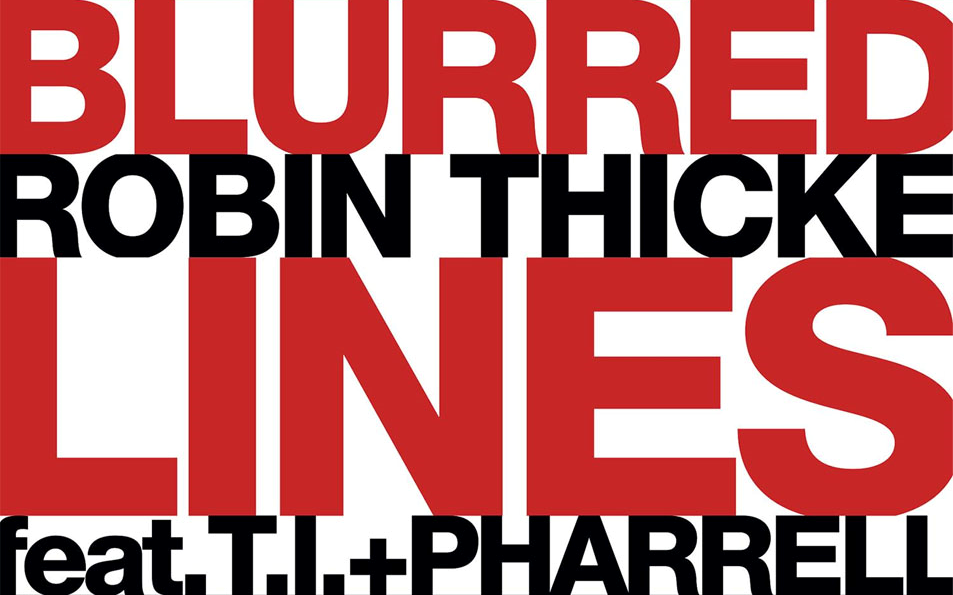It’s been three years now since the release of Robin Thicke’s ‘Blurred Lines’ and despite it long disappearing out of the charts and therefore from Przym’s dance floor (thank god), it still seems students’ unions and feminist groups up and down the country are still tearing their hair out over it.
Indeed, just yesterday in a rather public debate on the Facebook page of one of the union’s elected officers, the question of the banning of Blurred Lines was once again up for debate.
In 2013 the song went to the number one spot in 25 countries, spending 5 weeks at number one in the UK and selling over 14.8 million copies worldwide, that’s despite it being widely discredited as annoyingly catchy and horrifically overplayed.
Aside from its apparent success, Blurred Lines found itself at the centre of controversy surrounding its questionable lyrics and explicit video. It’s been widely criticised for trivialising sexual consent, perpetuating rape culture and being down right misogynistic.
Some of the lyrics are certainly disgusting. I think it’s pretty obvious what’s implied in the words, “I hate these blurred lines”. Yet I believe the banning or “no platforming” of this song (and others) is a little troubling.
My main problem with the outright ban of this song on university campuses is where do we draw the line? Many have suggested the song could be “triggering” to survivors of sexual assault, this may be true, and perhaps I am not the best qualified to set out what is and isn’t triggering, but I think all things considered this is a step to far.
Beyond the safe space bubble of Sussex University Campus, there is a real world out there, and I feel obliged to tell you, it exists without trigger warnings, jazz hands and “no platforming”. Yes, what you’ve heard is true, there are things much more harrowing in the world than the charts’ current top 20.
In an attempt to show quite how ridiculous the ban on this particular song is, I set about subjecting myself to an afternoon of listening to the top 20 and looking at the lyrical content. Bare in mind, the top 20 are the 20 most purchased songs in the UK currently.
This week’s number 5: Fifth Harmony’s Work from Home. In my opinion it is pretty anti-feminist in that it is lyrically advocating traditional gender roles, and the video objectifies women’s bodies.
Number 7: DNCE – Cake by the Ocean
“See you walking ’round like it’s a funeral
Not so serious, girl; why those feet cold?
We just getting started; don’t you tip toe, tip toe”
Make of these lyrics what you will, but just like Blurred Lines; annoyingly catchy and a questionable approach to sexual consent?
And finally Number 12: Tinie Tempah – Girls Like
“I was getting blowed before girls were putting out”
I don’t think I’ll explain this one.
Does this mean that students’ unions should be approving the lyrics of all songs before they get the go ahead to be played in bars, shops, clubs and food outlets?
I would argue absolutely not, and this argument goes way beyond Blurred Lines. We’re turning our campuses into something out of Orwell’s 1984.
University is the time in your life where you should be encountering all manner of people and opinions, and shutting someone or something down because you disagree with it is a step backwards and actually quite damaging.
Before uni I considered myself to be quite left wing and a firm feminist, yet since being at uni, if we take Sussex’s definition of these terms, I have discovered I appear to be far from it.
To suggest that Blurred Lines has the capability to “trigger” someone into a PTSD attack, when we are happy to play the music of Chris Brown – convicted for the appalling physical abuse of his ex girlfriend Rihanna, is absurd.
And before I get shut down, censored and labelled oppressive for minimising rape and sexual assault, I’d like to add this; to suggest sexual assault survivors need protecting from chart music is minimising, patronising and down right ridiculous.
Lucy Williams






I have to admit, i’m in total agreement. I am a feminist, and a sexual assault survivor. I understand that people respond to assault differently, and other people may be a bit more sensitive than I am, but I think that rather than placing so much emphasis on song content, the uni should continue to focus their energy on delivering consent workshops. At the end of the day the songs may trigger anxiety, but maybe if the perpetrators had been taught the proper guidelines around consent, there wouldn’t be a demand to censor music in order to avoid triggering anxiety for survivors. I understand that the song has a potential to normalise rape culture, but maybe we should place our focus on educating people to be less impressionable rather than trying to shelter everybody from certain songs etc that might influence them or trigger anxiety.
I think the only patronizing thing here is your argument. Sexual assault survivors are fully aware of the brutal prisms of “the real world” outside of university, thank you very much, and I actually see opposition to this song as a stand against rape culture and everyday misogyny more than an opposition to the playing of this song in itself. Yes, there are lots of questionable songs out there; however this is a very popular song that trivializes rape. As a person who was the victim of a serious sexual assault, not only do I feel degraded by the lyrics of the song, which echo the words spoken by my attacker as he was molesting me (“you know you want it, come on, you’re an animal, it’s in your nature…” etc), I also feel traumatized by the casual arrogance and nonchalance with which people like you dismiss my concerns and experience. So thanks for contributing to that. By the way, most leftwing and feminist groups have very much moved on from this and are dealing with other things, we only “tear our hair out” when we have to waste our time reiterating for the millionth occasion what is problematic about Blurred Lines to people like you.
I have to ask, is this really the best thing you could think of to write about? There are so many injustices and human rights infringements out there, a few student unions being concerned about the feelings of rape victims and making this tiny stand against rape culture hardly subjects Robin Thicke to a human rights abuse, the like of which we see across the world where people, particularly women, are put to death for free speech. So maybe save your 1984 allusions. I think it’s really sad that this is the ‘issue’ what you’ve gotten angry about and dedicated your time to. Maybe you should just go back to the drawing board.